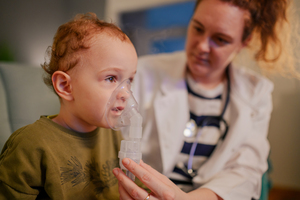Key points
- Drug allergies, unlike side effects, involve an abnormal immune response that can lead to severe reactions.
- Various medications can trigger allergic reactions, including seizure medications, penicillin, sulfa drugs, insulin, and iodine-containing substances.
- Symptoms of drug allergies can range from mild skin irritations to life-threatening reactions like anaphylaxis.
- Treatment for drug allergies depends on the severity of the reaction and can include bronchodilators, corticosteroids, antihistamines, and epinephrine injections.
- Prevention of drug allergies can be challenging, but proactive measures can help reduce the risk of developing allergies or experiencing allergic reactions to necessary medications.

It is essential to understand that a drug allergy is distinct from a drug side effect, according to the American College of Allergy, Asthma and Immunology (AAAI) — they note that while side effects are common and often expected responses to medication, drug allergies involve an abnormal immune response that can lead to severe and sometimes life-threatening reactions. By clarifying these differences, we aim to equip readers with the knowledge necessary to recognize the signs of a drug allergy and understand the appropriate steps to take for management and treatment.
What You Should Know About Drug Allergies
A drug allergy occurs when the immune system mistakenly identifies a medication as a harmful substance and mounts an immune response against it, according to the National Library of Medicine (NLM). They note that this reaction can lead to a range of symptoms, which may vary in severity from mild to life-threatening. Unlike typical side effects, which are expected and can occur in anyone taking the medication, drug allergies are specific to individuals who have a hypersensitivity to that particular drug.
For example, according to the NLM, penicillin (a commonly prescribed antibiotic) is known to cause allergic reactions in some individuals. Symptoms of a penicillin allergy can include hives, itching, swelling, difficulty breathing, and, in severe cases, anaphylaxis—a rapid and severe allergic reaction that requires immediate medical attention. Recognizing and understanding drug allergies is crucial for ensuring patient safety and effective treatment.
Drug Allergy Causes
Understanding the causes of drug allergies is essential for both patients and healthcare providers, as it can significantly impact treatment decisions and patient safety, according to the World Allergy Organization (WAO). Various medications can trigger allergic reactions, often due to the way the immune system responds to certain compounds within these drugs. Below is a list of common causes of drug allergies:
-
Seizure medications, such as phenytoin and carbamazepine
-
Penicillin and related antibiotics, including amoxicillin and ampicillin
-
Sulfa drugs, like sulfamethoxazole
-
Insulin, particularly animal-derived formulations
-
Iodine-containing substances, such as x-ray contrast dyes, which can provoke allergy-like reactions
Recognizing these potential allergens can help in the prevention and management of drug allergies for affected individuals.
Drug Allergy Symptoms
Recognizing the symptoms of drug allergies is crucial for timely intervention and treatment. Symptoms can vary widely in their presentation and severity, ranging from mild skin irritations to life-threatening reactions like anaphylaxis. Understanding these symptoms can help individuals identify potential allergic reactions and seek appropriate medical care. Below is a list of common symptoms associated with drug allergies, according the WAO:
Common Symptoms
-
Itching of the skin or eyes
-
Skin rash
-
Swelling of the lips, tongue, or face
-
Wheezing
-
Bleeding
-
Hives
Anaphylaxis Symptoms
-
Confusion
-
Diarrhea
-
Difficulty breathing, accompanied by wheezing or a hoarse voice
-
Abdominal pain or cramping
-
Dizziness
-
Fainting or feeling lightheaded
-
Hives appearing on various parts of the body
-
Nausea or vomiting
-
Rapid heartbeat
-
Palpitations
Additional Conditions Linked to Drug Allergies
-
Inflammation in the kidneys
-
Drug-induced anemia
-
Serum sickness
-
Drug rash with eosinophilia and systemic symptoms
Being aware of these symptoms can empower individuals to act swiftly in the event of an allergic reaction, potentially saving lives.
Diagnosing Drug Allergies: What You Need to Know
Diagnosing drug allergies can be a complex process, as the symptoms often overlap with those of other medical conditions or reactions to medications, according to the AAAI. A thorough evaluation by a healthcare professional is essential for accurate diagnosis. The process typically begins with a detailed medical history, including information about previous drug reactions, current medications, and any relevant family history of allergies. In some cases, specific tests may be conducted to confirm the presence of a drug allergy. Below are some of the most common tests used for diagnosing drug allergies, as listed by the AAAI:
-
Skin Tests: These involve applying a small amount of the suspected allergen to the skin and observing for a reaction.
-
Blood Tests: These tests measure the immune system's response to specific drugs by detecting antibodies or other markers.
-
Drug Provocation Tests: Under controlled conditions, a healthcare provider may administer the suspected drug in gradually increasing doses to monitor for any allergic reactions.
-
Patch Tests: These are used primarily for delayed-type hypersensitivity reactions, where small amounts of the drug are applied to the skin and observed over a period of time.
Accurate diagnosis is crucial for effective management and to prevent future allergic reactions, making it essential for patients to work closely with their healthcare providers.
What’s the Treatment for Drug Allergy?
When it comes to treating drug allergies, the approach largely depends on the severity of the allergic reaction and the specific symptoms presented, according to the WAO. They explain that immediate intervention is crucial, especially in cases of severe reactions like anaphylaxis. Treatment options aim to alleviate symptoms, reduce inflammation, and, if necessary, counteract life-threatening reactions.
Below is a list of common treatments for drug allergies:
-
Bronchodilators: These medications help relax and open the airways, making it easier to breathe. They are often used in cases of wheezing or difficulty breathing.
-
Corticosteroids: These anti-inflammatory medications can reduce swelling and inflammation in the body, providing relief from symptoms such as hives and skin rashes.
-
Antihistamines: These drugs block the action of histamine, a chemical released during allergic reactions, helping to alleviate symptoms like itching, hives, and sneezing.
-
Epinephrine Injection: This is a life-saving treatment for severe allergic reactions (anaphylaxis). It works quickly to constrict blood vessels, relax airways, and reduce swelling, providing immediate relief from potentially life-threatening symptoms.
Understanding these treatment options can empower individuals to respond effectively to drug allergies and seek appropriate medical care when needed.
Indicators That You Should See a Doctor
Recognizing when to seek medical attention for a drug allergy is crucial for ensuring safety and preventing serious complications, according AAAI. Certain indicators can signal that a reaction may be severe or life-threatening, necessitating immediate evaluation by a healthcare professional.
If you experience any of the following symptoms, it is essential to seek medical help promptly:
-
Difficulty breathing: This may manifest as shortness of breath, wheezing, or a feeling of tightness in the chest, indicating a potential airway obstruction.
-
Trouble swallowing: Swelling in the throat or mouth can impede the ability to swallow, posing a serious risk.
-
Sudden weakness or lightheadedness: These symptoms may indicate a drop in blood pressure or an impending fainting episode, often associated with severe allergic reactions.
-
Rapid heartbeat: An increased heart rate can signal a body under stress due to an allergic reaction and may require urgent attention.
-
Loss of consciousness: Fainting or feeling faint can be a sign of anaphylaxis or severe shock, which requires immediate medical intervention.
Being aware of these indicators can help individuals react swiftly and appropriately in the event of a drug allergy, ultimately safeguarding their health.
Is it Possible to Prevent Drug Allergies?
Preventing drug allergies can be challenging, as the exact cause of these allergic reactions often remains unknown, according to the AAAI. However, they note that there are proactive measures individuals can take to reduce the risk of developing drug allergies or experiencing allergic reactions to medications they may need. Awareness and education about personal medical histories, including any known allergies, play a crucial role in prevention.
One effective strategy, according to the AAAI, is to communicate openly with healthcare providers about any previous allergic reactions to medications, as well as family histories of drug allergies. This information can guide clinicians in prescribing safer alternatives. Additionally, patients should be encouraged to read medication labels and be vigilant about potential allergens in both prescription and over-the-counter drugs. While it may not be possible to prevent all drug allergies, these steps can significantly minimize the risk and ensure safer medication use.
Urgent care near me
Use SolvHealth to find top-rated urgent care clinics near you for drug allergy treatment.
FAQs
What is the difference between a drug allergy and a drug side effect?
A drug allergy involves an abnormal immune response to a medication, which can lead to severe reactions. In contrast, a drug side effect is a common and often expected response to a medication.
What are some common causes of drug allergies?
Common causes of drug allergies include seizure medications, penicillin and related antibiotics, sulfa drugs, insulin, and iodine-containing substances.
What are some symptoms of a drug allergy?
Symptoms of a drug allergy can range from mild skin irritations to severe reactions like anaphylaxis, which can include difficulty breathing, rapid heartbeat, and loss of consciousness.
How are drug allergies diagnosed?
Drug allergies are diagnosed through a detailed medical history and specific tests, such as skin tests, blood tests, drug provocation tests, and patch tests.
How are drug allergies treated?
Treatment for drug allergies depends on the severity of the reaction and can include bronchodilators, corticosteroids, antihistamines, and epinephrine injections.
How can drug allergies be prevented?
Preventing drug allergies can be challenging, but proactive measures like informing healthcare providers of any known allergies can help reduce the risk of developing allergies or experiencing allergic reactions to necessary medications.
When should I seek medical attention for a suspected drug allergy?
It's crucial to seek medical attention immediately if you suspect a drug allergy, especially if symptoms are severe or worsening, to prevent serious complications.
Can any medication cause a drug allergy?
Yes, various medications can trigger allergic reactions, often due to the way the immune system responds to certain compounds within these drugs.









